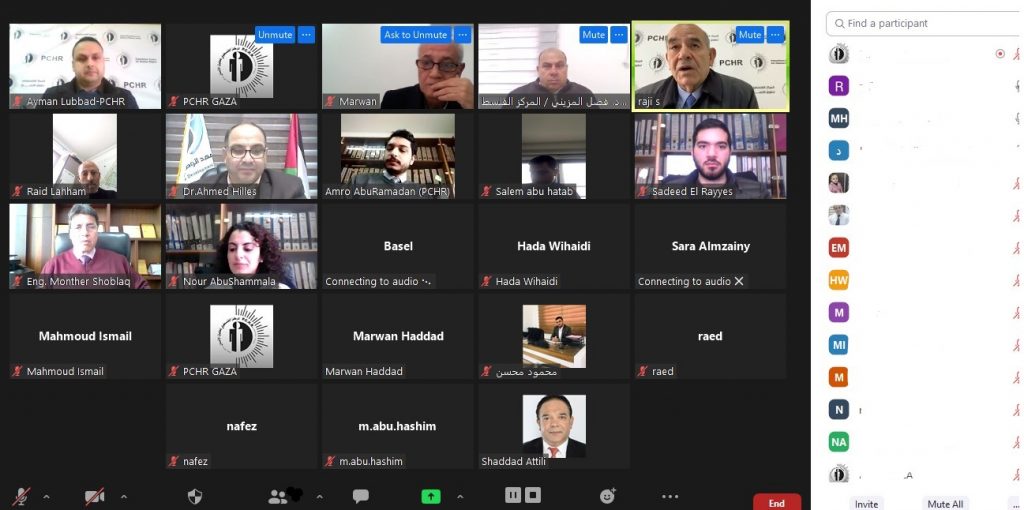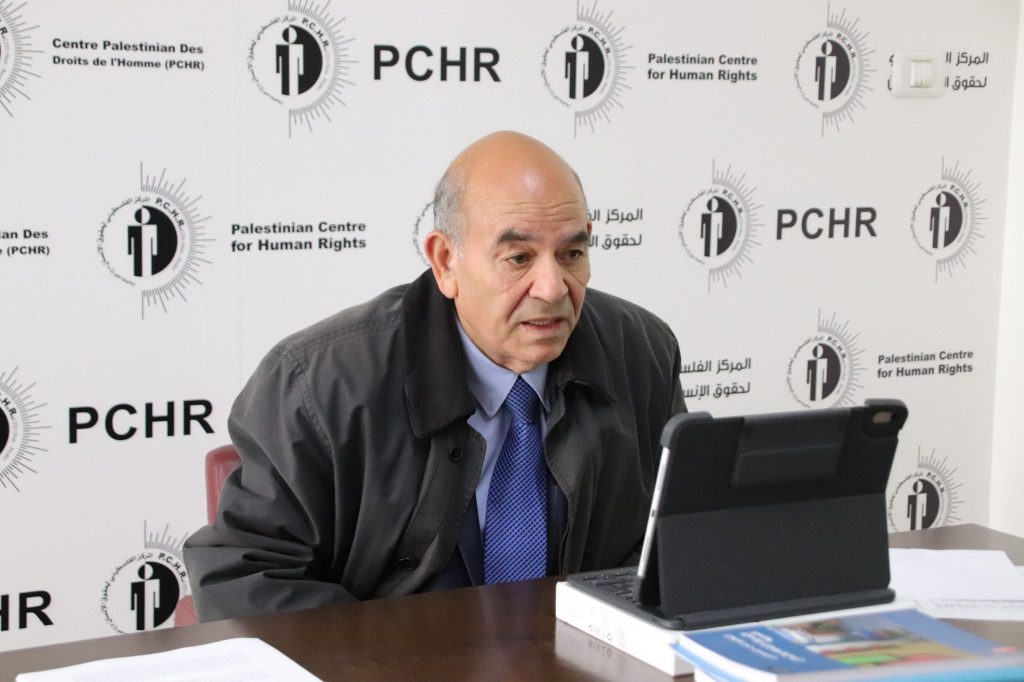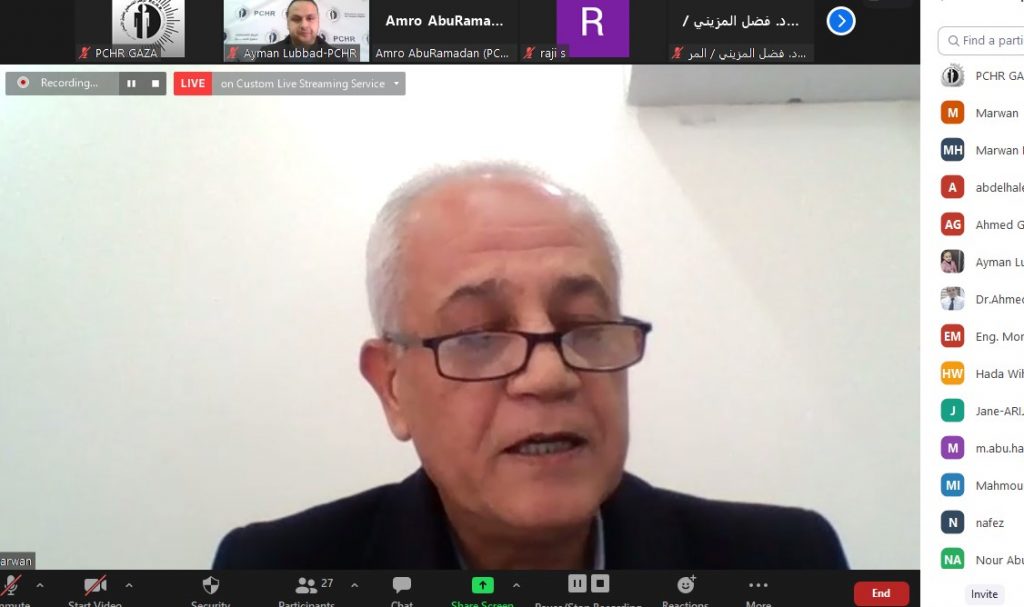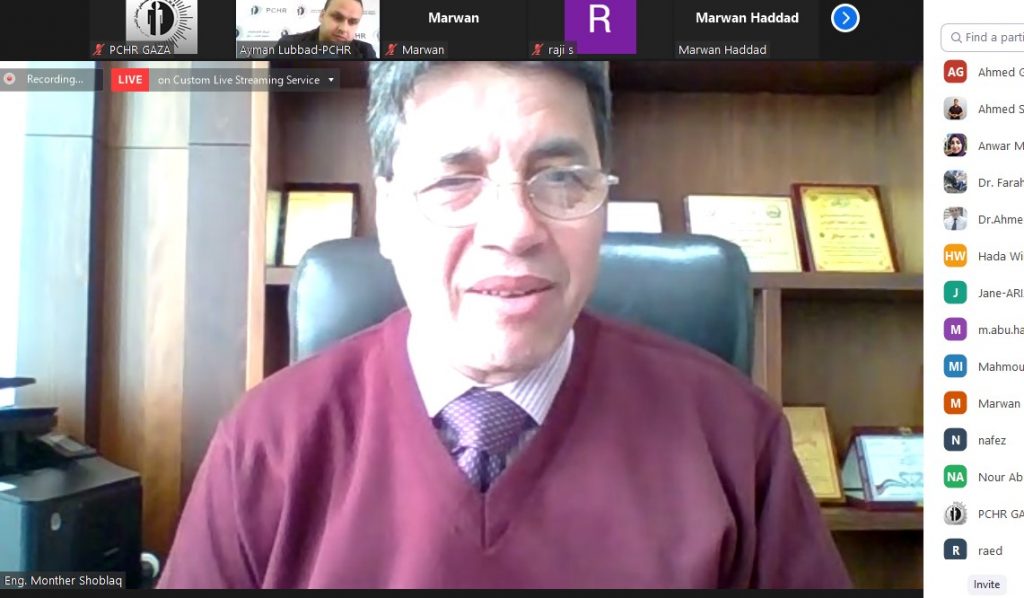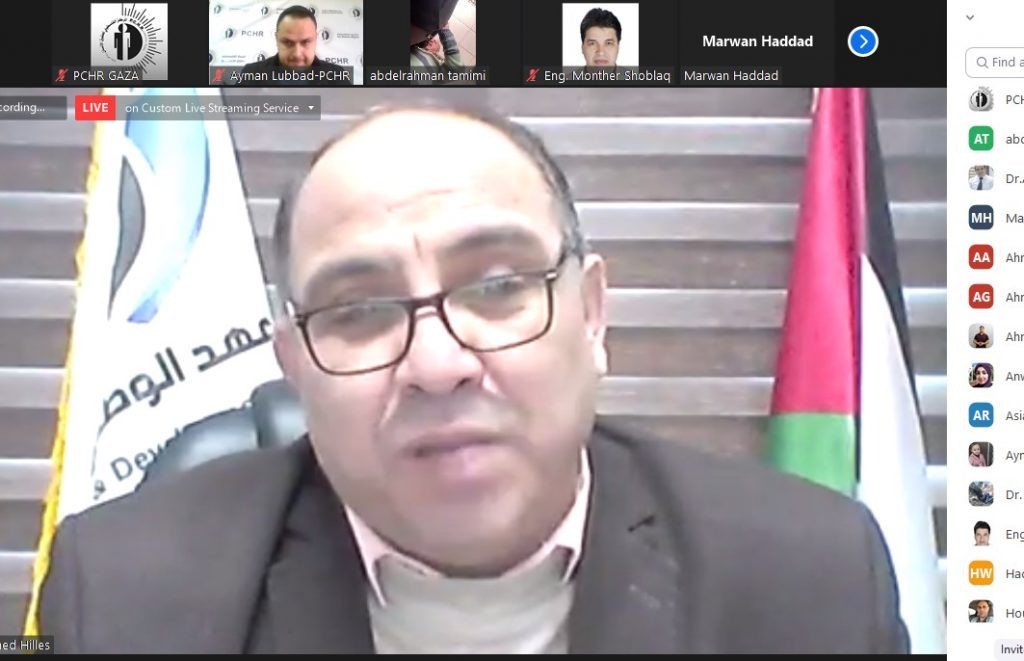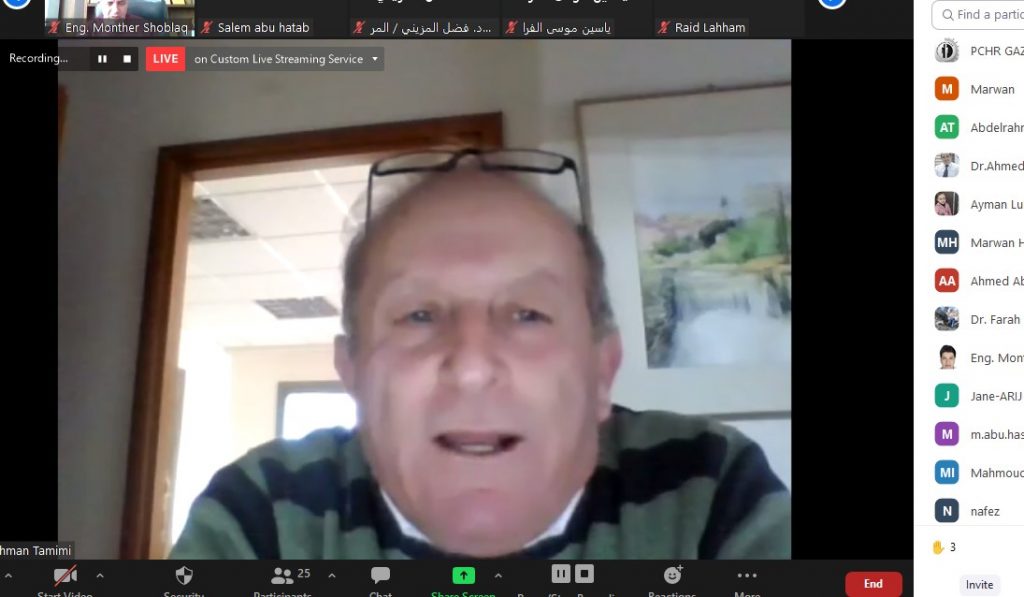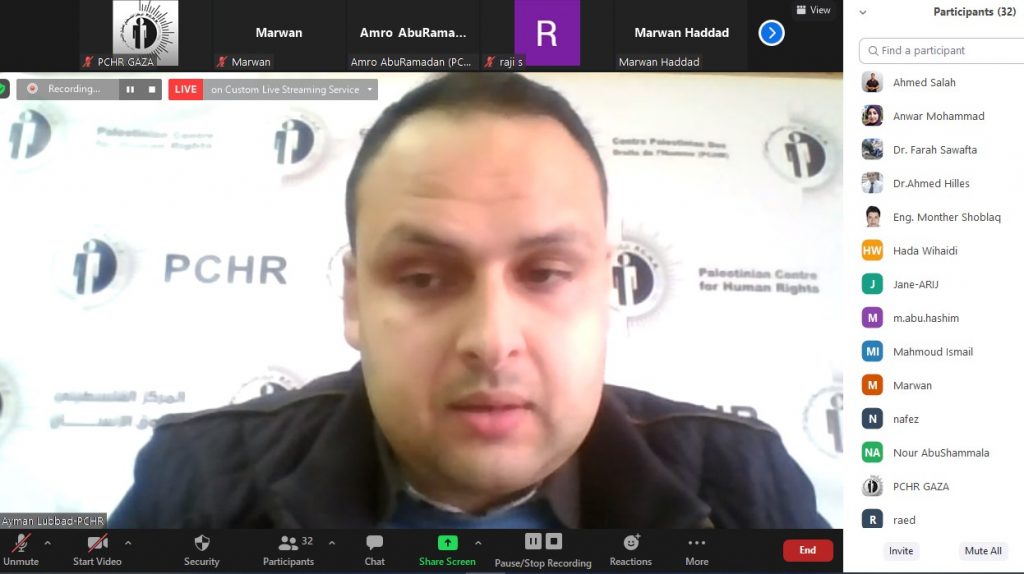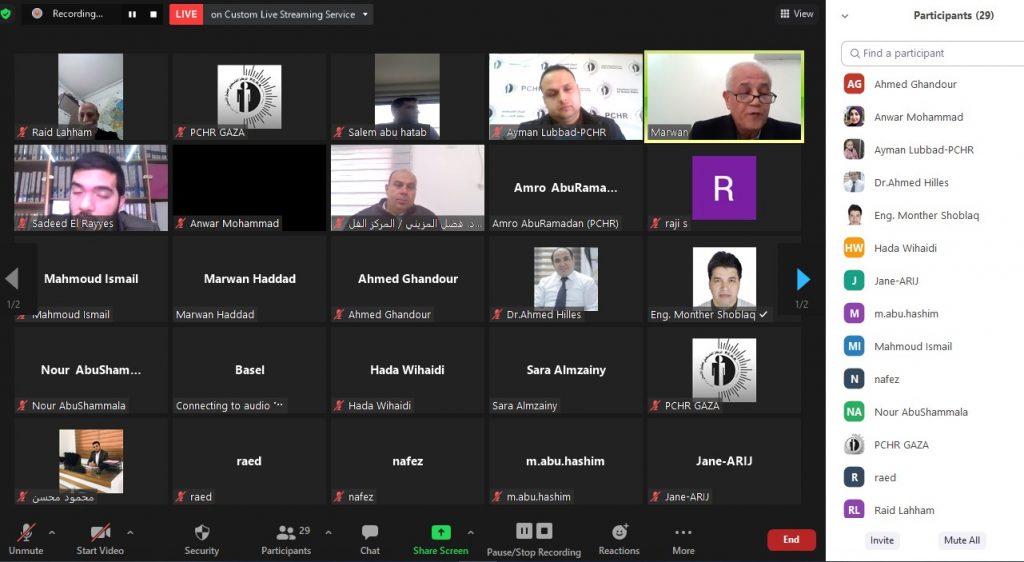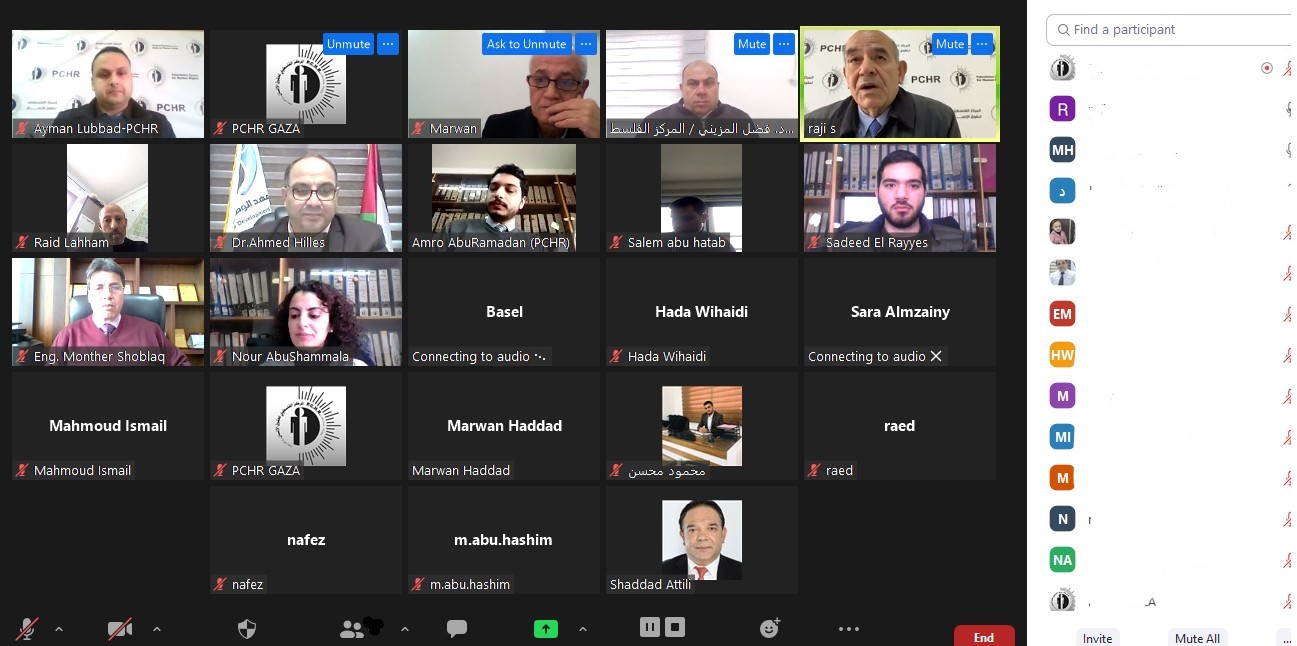
Ref: 06/2022
Date: 21 March 2022
On Monday, 21 March 2022, Palestinian Centre for Human Rights (PCHR) organized a workshop titled as “Palestinian Water Rights in Light of Israeli Violations” on Zoom, and it was attended by the Palestinian Water authority, Palestinian Environment Quality Authority, Coastal Municipalities Water Utility (CMWU), Palestinian Hydrology Group, and Water and Environment Studies Institute at An-Najah National University in addition to human rights activists and academics. The panel discussion was facilitated by Ayman Lubbad, a researcher at PCHR’s Economic and Social Rights Units. He pointed out that the panel is part of PCHR’s concern in strengthening economic and social rights in Palestine and coincides with the World Water Day, themed this year as “Groundwater: Making the Invisible Visible.”
Mr. Raji Sourani, PCHR’s Director, inaugurated the panel discussion, stressing the Israeli occupation’s practices against the Palestinian people and its almost full control over the Palestinian water resources, including Palestinian underground water basins and the Jordan River Basin resources, have in all deprived Palestinians by force of their legitimate water resources and stole them. Sourani added that these violations amount to war crimes and crimes against humanity that is asserted at 2002 Durban Conference and by many international reports, which all say that we are facing a new brand of apartheid. Sourani said that the Israeli domination of Palestinian water resources negatively affect the development process and its sustainability as well as the Palestinians’ rights, particularly their right to an adequate standard of living and access to clean and safe water.
Marwan al-Bardawil, Head of the Project Coordination Unit at the Palestinian Water Authority, talked about water reality in Palestine and Israeli occupation’s control over the Palestinian water resources along with specifying water quotas for Palestinians and banning them from digging or developing wells, rendering it a big challenge for the governmental bodies when providing water to citizens. Al-Bardawil emphasized that water resources in the West Bank and Gaza Strip suffice the needs of Palestinian population; however, the occupation’s practices and control over water declined the daily water consumption per capita from 180 litters to 40-50 litters that is less than what was recommended by the World Health Organization, which is 100 liters per person per day. Al-Bardwil reviewed the water crisis in the Gaza Strip and reasons behind its aggravation, including 35% of the population not being on the main sanitation network that leads to the coastal groundwater aquifer pollution. He added that the occupation restricted government’s capacities in water management by targeting water networks and infrastructure. He also addressed the Palestinian Authority’s efforts in saving Gaza Strip’s aquifer and returning to rely on it by establishing 3 water desalination plants in the Strip, stressing the importance of achieving water security in light of the occupation’s dominance on the main water basins in the West Bank as settlements are extensively established to ban Palestinians from developing old wells or building new ones.
Meanwhile, Engineer Monther Shublaq, CMWU Director General, reviewed the water crisis in the Gaza Strip and the ways to face it. He said that international organizations fund water projects considering them of relief rather than developmental purposes, adding that they abstained from offering funds in light of the ongoing Palestinian political division. Shublaq emphasized that UN report in 2011 revived donations going to water projects to avoid a humanitarian catastrophe in Gaza; this of course would improve both the system which supplies potable water to citizens and drinking water resources. Regarding the occupation’s measures, he said that the desalination plants and water project slowly operate due to Israel’s delay of allowing import of the equipment necessary for these projects. He added that human rights organizations have always supported us in making our voice heard to put pressure on Israel in order to allow the entry of these equipment and ensure ongoing operation of these important water projects.
Dr. ‘Abed al-Rahman al-Tamimi, General Director of Palestinian Hydrology Group (PHG), talked about the scenarios of water future status in Palestine, in the light of the ongoing construction of settlements by Israeli authorities, population growth, increasing urbanization rate, and traditional agriculture practices, stressing that all these factors cause groundwater depletion. Al-Tamimi added that Israeli authorities seek to make Palestinians dependent on desalination plants in the Gaza Strip, in order to end Palestinian dependency on Israel and stop their demands for their rights to the exploited natural water sources. Al-Tamimi emphasized that the desalination option in the Gaza Strip must be carefully studied, as it has negative consequences, including increasing the salinity of seawater and damaging fishing sector. He calls for establishing seawater desalination plants and studying their impact, while maintaining the permanent demand for Palestinian water rights.
For his part, Dr. Marwan Haddad, Former Director of Water and Environmental Studies Institute at Al-Najah National University, talked about Israeli violations of Palestinian water rights in the light of international law, stressing the failure of the Palestinian government to demand Israel and put pressure on it to obtain Palestinian water rights. Haddad added that ending Palestinian dependency on Israel needs exerting more efforts to demand Palestinian water rights before all international bodies, including international courts, by using means based on international water law and international law. He indicates that depriving Palestinians of their water resources weakens development and worsens their economic and social conditions.
With regard to the repercussions of the water crisis on Palestine’s environmental situation, Dr. Ahmed Helles, Director of the Awareness Department at the Environment Quality Authority, affirmed that water pollution in Palestine and the salinity of water, particularly in the Gaza Strip, adversely affected various development sectors. He indicated that water produced by private desalination plants does not provide citizens with safe and healthy water, as these plants remove useful salts from water. Helles emphasized that Israeli occupation forces contribute to destroying the rich environment of Gaza Valley, which is one of the most important water resources in the strip, by establishing dams preventing the water flow from the West Bank mountains into the Mediterranean Sea. Helles clarified that the Palestinian division significantly affects and weakens services provided by local and municipal councils for citizens in the Gaza Strip.
At the end of the panel discussion, the participants recommended the importance of using international law tools to obtain Palestinian water rights and stop Israeli violations, which need excreting double and joint efforts by the Palestinian government, Palestinian civil society organizations and human rights organizations. The participants also stressed the need to overcome the Palestinian political division and work on the governance of water sector to ensure fair water allocation and monitor the quality of water provided for citizens in Palestine.
